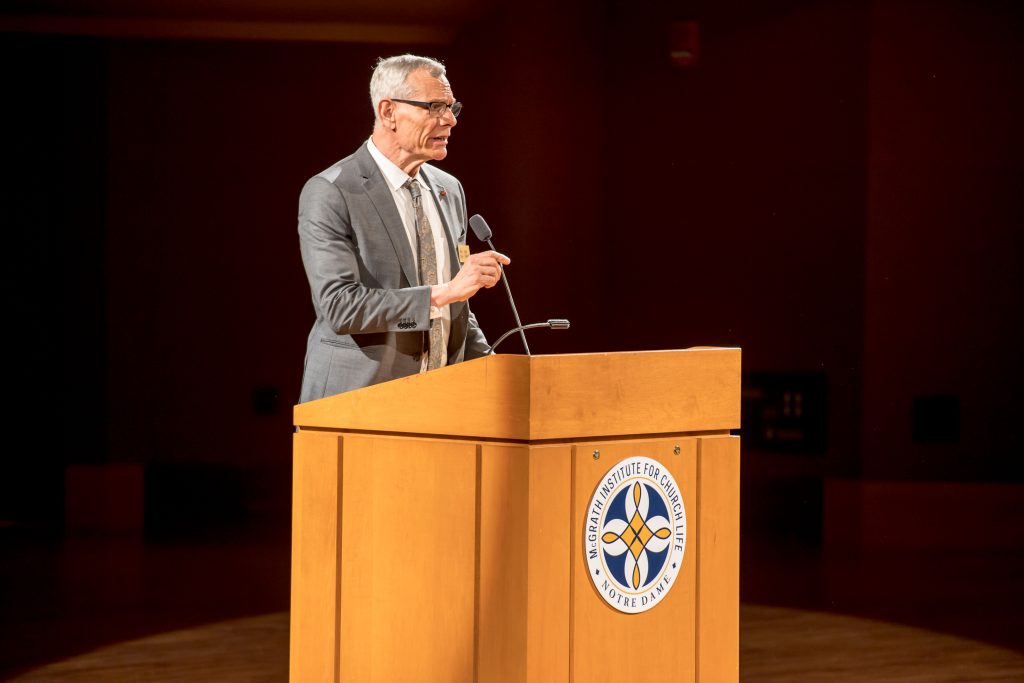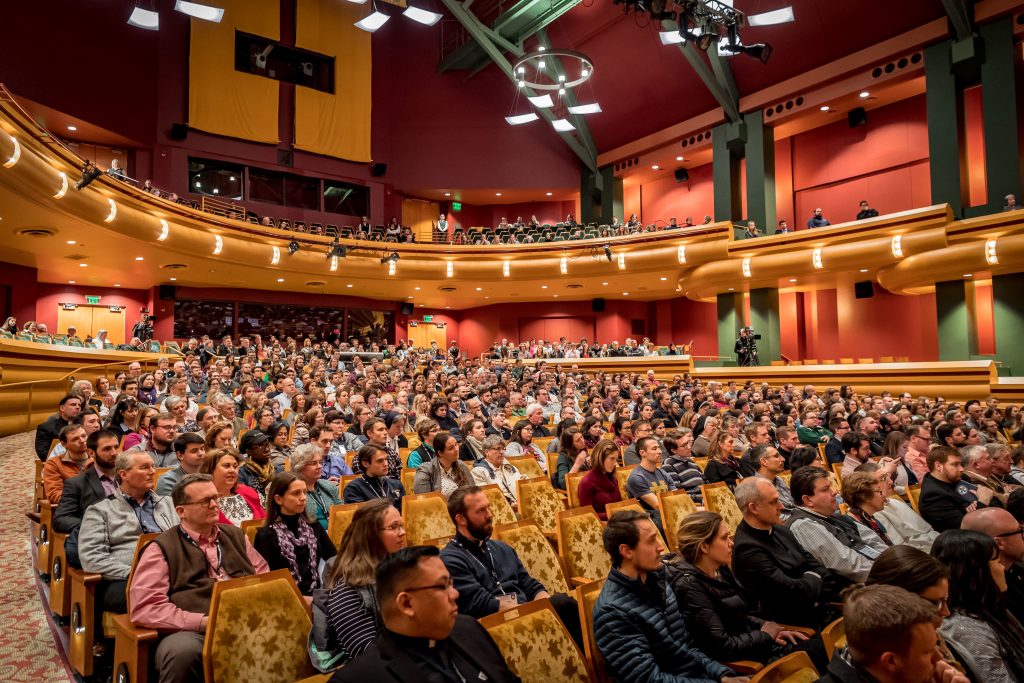March 15, 2018 // Special
At Notre Dame, Bishop Barron discusses challenges, strategies for cultivating faith among youth
Pope Francis’ recently issued World Youth Day message calls attention to the upcoming Synod of Bishops on “Young People, the Faith and Vocational Discernment,” and focuses on the reassuring words spoken at the Annunciation: “Do not be afraid, Mary, for you have found favor with God.” Indeed, the uncertainty Our Lady felt regarding God’s invitation and plan for her life is shared by many young people in the Church today. For this reason, from March 5-7 the McGrath Institute for Church Life sought to address the topic of building “Cultures of Formation,” by inviting renowned leaders and professionals in Catholic ministry to share their experiences, research and hopes for the future.

March 5, 2018; McGrath Institute for Church Life director John Cavadini introduces Most Rev. Robert Barron, auxiliary bishop of the Archdiocese of Los Angeles and founder of Word on Fire Catholic Ministries for the keynote address at a conference called Cultures of Formation: Young People, the Faith and Vocational Discernment. (Photo by Matt Cashore/University of Notre Dame)
Dr. John Cavadini, director for the McGrath Institute for Church Life, encouraged participants to consider how, as a Church, “we create ecclesial cultures that are strategically designed in such a way that young people are formed in what is most beautiful, most grand, most appealing, and at the same time most necessary.” He indicated that this must go beyond relying solely upon youth or young adult ministry programming, but to look also to the natural cultures of formation, to “the family, the liturgy, the school, the parish-based works of mercy. We have to be more intentional to think of all of these precisely as cultures of formation in which our young people will be formed more easily into adult Catholics thirsting for a life of everyday holiness.”
The Most Rev. Robert Barron, Auxiliary Bishop of Los Angeles and founder of Word on Fire Catholic Ministries, offered the opening night keynote address, titled “Looking for the Nones,” which focused on key reasons young people tend to drift away from God and the Church and become impeded in their vocational search. Drawing upon research from sociologist Christian Smith, Bishop Barron stated, “Many speak of “my truth” or “your truth,” but would be uncomfortable with any talk of “the truth.” Such a view precludes real responsibility; in the measure that I cannot or will not decide, I can remain permanently uncommitted. In the religious context this is debilitating and it leads to irresponsibility in the highest and most important things. Every saint makes a judgment and takes a stand. Every catechist and evangelist needs to have a passionate response for their belief in God.”

March 5, 2018; Most Rev. Robert Barron, auxiliary bishop of the Archdiocese of Los Angeles and founder of Word on Fire Catholic Ministries gives the keynote address at a conference called Cultures of Formation: Young People, the Faith and Vocational Discernment. (Photo by Matt Cashore/University of Notre Dame)
He further expressed that, “Former Catholics are distinct in that more of them report that none of their close friends is at all religious. However, religion thrives through friendship; Thomas Aquinas believed religious conversation was of the highest value.” He continued, “Others see religious faith as illogical or unscientific. Healing the rift between science and religion may be our most important task, our Catholic scientists and medical professionals need to start talking to our young people! Additionally, in our Catholic schools, we have often downplayed an intellectual articulation of the faith which has left students blocked by intellectual conundrums. If young people can handle Shakespeare, Einstein, and Virgil, why in the world couldn’t they handle Aquinas, Augustine and Chesterton?”
Regarding the fundamental question at hand of vocational discernment, Bishop Barron remarked: “The Word of God is exceptionally hard to hear, especially for the young. We need elders, those who know how to hear the voice of God in the radical contingency of the world, in the narrative of the Bible, in the definitive teaching of the Church, in the beauty of the saints. We need an army of Eli’s to rise up who know how to hear and interpret the Word of God and help our young people discern that voice, so they can learn to live in the space of God’s drama for their lives.”
Katherine Angulo, associate director of Youth Ministry for the Archdiocese of Atlanta, further reflected upon the necessity of reaching young people early in their faith journey and facilitating encounters that are heartfelt and authentic. She stated that, “catechesis and evangelization do not just take place in a classroom, they involve relationships — which requires learning what healthy relationships look like — as well as engaging in service, experiencing mercy and hearing about the value of the cross that Jesus invites us to carry and follow after Him.” She also highlighted the importance of introducing students to others their own age who take the faith seriously by arranging trips to the National Catholic Youth Conference, Steubenville Conferences, Notre Dame Vision and others.
 Leonard DeLorenzo, Ph.D., director of Notre Dame Vision, additionally emphasized the responsibility of both the Church community and the individual in arriving at the ability to healthily discern a vocation. “The point of discernment would seem to be to take the responsibility for being someone; it is a declaration of ‘I am,’ as Mary was “the handmaid of the Lord,” he stated. He expressed that arriving at this decision “to say ‘yes’ with your voice and with your life requires accompaniment” in an environment that promotes “cultivating the freedom necessary for that ‘yes’ and building up the courage to say it and mean it and live it, and to do our part to make it so.”
Leonard DeLorenzo, Ph.D., director of Notre Dame Vision, additionally emphasized the responsibility of both the Church community and the individual in arriving at the ability to healthily discern a vocation. “The point of discernment would seem to be to take the responsibility for being someone; it is a declaration of ‘I am,’ as Mary was “the handmaid of the Lord,” he stated. He expressed that arriving at this decision “to say ‘yes’ with your voice and with your life requires accompaniment” in an environment that promotes “cultivating the freedom necessary for that ‘yes’ and building up the courage to say it and mean it and live it, and to do our part to make it so.”
Nicholas Carr, a technology and culture writer and previous finalist of the Pulitzer Prize, offered the featured lecture on Tuesday evening. His talk, titled “Our Smartphones, Ourselves,” offered scientific and statistical data to convey the dangers significant reliance on technology can have on cultural, catechetical and intellectual development. He stated, “Smartphones pull concentration away from face-to-face relationships and steal the opportunity to be alone with our own thoughts, sucking cognitive resources from our minds.” This stunts the ability to learn, create and obtain new skills. He also emphasized the obligation families have to “be refuges from technology” where young people can learn the communication and life skills that “technology will never teach.”
After his presentation, Vickie Lortie, youth ministry coordinator at St. Jude Parish, Fort Wayne, shared her experience of witnessing the powerful role liturgy can also play in lives of young people. She indicated that when dilemmas arise and technology fails to provide answers, she has often seen her students turn to eucharistic adoration to find silence, direction and renewal. “A lot of our high school teens say that’s what they do; they know that’s the answer and where to go when the going gets tough.”
The conference included 515 participants, among them 23 bishops, and concluded with Mass at the Basilica of the Sacred Heart celebrated by Bishop Bill Wack, CSC, of the Diocese of Tallahassee-Pensacola. A video replay of Bishop Barron’s speech may be accessed on his public Facebook page. Many of the other conference speeches will be made available online.
The best news. Delivered to your inbox.
Subscribe to our mailing list today.






